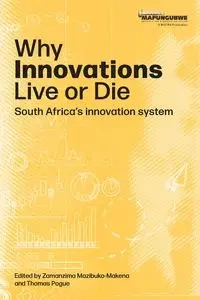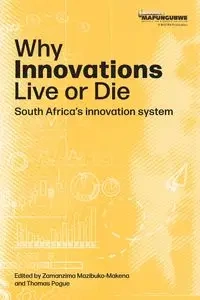Why innovations Live or Die - Mazibuko-Makena Zamanzima
- South Africa's innovation system
A vision for South Africa's National System of Innovation (NSI) was articulated some three decades ago in the White Paper on Science and Technology (1996). The idealism that inspired a nation in rebirth also found expression in policy for the science and innovation sector. Since then, the NSI has been moulded and re-moulded in light of domestic and global experiences.
This volume, Why Innovations Live or Die: South Africa's innovation system, interrogates the systems and the issues surrounding them. Contributing authors argue that the fundamental question is about the relevance of innovations to the country's citizens, and whether the system promotes economic growth, social inclusion and initiative across all sectors of the population.
The authors examine lessons from some highly promising research endeavours that fell by the wayside. Importantly, the book interrogates the successes of South African innovations that have impacted positively on people's lives. Various chapters trace the journeys of undertakings such as the Joule electric car; the Square Kilometre Array, the Pebble-bed Modular Reactor and transdisciplinary efforts on HIV and Covid-19.
The contributors argue that the philosophical outlook that informs innovation policy, the attitude of mind in both the public and private sectors, and the content and timeframes attached to national development planning, among other factors, are as important as technical issues related to scientific expertise, training pipelines and resource allocation. In other words, the authors make a case for a system of innovation that functions as a holistic domain, straddling a variety of disciplines and spatial issues. The book also underlines the importance of broadening the vistas of research and avoiding path dependency. The volume proffers policy recommendations aimed at stimulating reflection and practical actions on a matter that is fundamental to South Africa's socioeconomic progress.
EAN: 9781920690458




A vision for South Africa's National System of Innovation (NSI) was articulated some three decades ago in the White Paper on Science and Technology (1996). The idealism that inspired a nation in rebirth also found expression in policy for the science and innovation sector. Since then, the NSI has been moulded and re-moulded in light of domestic and global experiences.
This volume, Why Innovations Live or Die: South Africa's innovation system, interrogates the systems and the issues surrounding them. Contributing authors argue that the fundamental question is about the relevance of innovations to the country's citizens, and whether the system promotes economic growth, social inclusion and initiative across all sectors of the population.
The authors examine lessons from some highly promising research endeavours that fell by the wayside. Importantly, the book interrogates the successes of South African innovations that have impacted positively on people's lives. Various chapters trace the journeys of undertakings such as the Joule electric car; the Square Kilometre Array, the Pebble-bed Modular Reactor and transdisciplinary efforts on HIV and Covid-19.
The contributors argue that the philosophical outlook that informs innovation policy, the attitude of mind in both the public and private sectors, and the content and timeframes attached to national development planning, among other factors, are as important as technical issues related to scientific expertise, training pipelines and resource allocation. In other words, the authors make a case for a system of innovation that functions as a holistic domain, straddling a variety of disciplines and spatial issues. The book also underlines the importance of broadening the vistas of research and avoiding path dependency. The volume proffers policy recommendations aimed at stimulating reflection and practical actions on a matter that is fundamental to South Africa's socioeconomic progress.
EAN: 9781920690458

